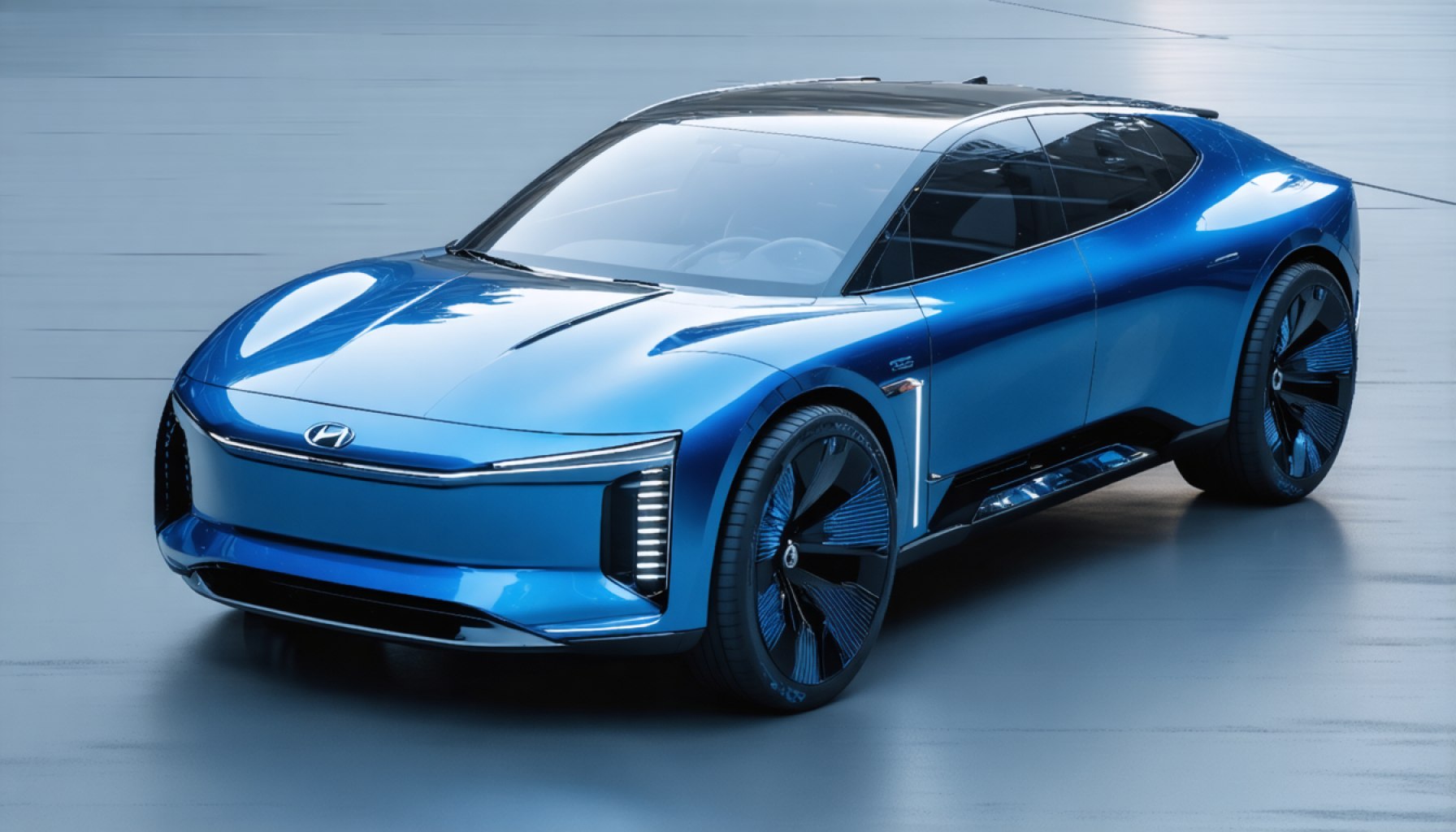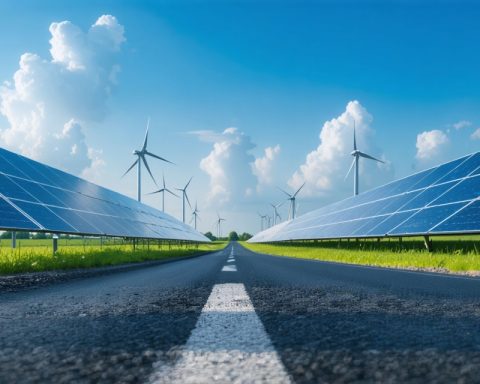- Hyundai unveils its Hyundai Motor Group Metaplant America (HMGMA) in Ellabell, Georgia, geared to produce 500,000 electric and hybrid vehicles annually.
- The facility launches the IONIQ 9, Hyundai’s first three-row SUV, with production set to invigorate the U.S. sustainable transportation market.
- Hyundai’s investment of $21 billion aims to boost U.S. manufacturing, forecasted to create 14,000 full-time jobs by 2028.
- The “intelligent manufacturing plant” integrates artificial intelligence and data analytics to enhance production efficiency.
- Hyundai’s ambitions are aligned with Kia, seeking to expand market presence amid global trade uncertainties, including potential tariffs.
- Beyond manufacturing, Hyundai emphasizes community empowerment and developing local talent in Georgia.
Beneath the sprawling sky of Ellabell, Georgia, Hyundai is crafting a revolution—one electric vehicle at a time. Nestled just 20 miles outside bustling Savannah, the recently unveiled Hyundai Motor Group Metaplant America (HMGMA) stands as a titan of innovation. This high-tech facility is poised to redefine the auto industry’s future with its promise to churn out 500,000 electric and hybrid vehicles annually under the Hyundai, Kia, and Genesis emblems.
As America’s appetite for sustainable transportation simmers, Hyundai fires up production of its groundbreaking IONIQ 9, their inaugural three-row SUV. Captured in expressive green, it’s a sleek marvel of engineering rigor, destined to glide down U.S. streets next spring. The factory buzzes with activity, where dedicated hands and robotic precision seamlessly forge the future of mobility from a blend of traditional craftsmanship and advanced technology.
The grand opening of the electrified assembly line was more than just a ribbon-cutting ceremony. As the world’s third-largest automaker, Hyundai, with a 35% stake in Kia, is making strategic strides to secure its place at the forefront of sustainable innovation. Hyundai’s executive chair, Euisun Chung, emphasized the company’s devotion to fostering robust relationships within Georgia—a statement that reverberates beyond corporate borders, underscoring a mission to empower communities while nurturing the talent within them.
Yet the backdrop to this celebration is anything but serene. As the global auto market trembles under the ripple of President Trump’s proposed 25% tariffs, particularly targeting Asian exports, Hyundai’s $21 billion investment commitment appears both audacious and prescient. This forward-thinking infusion aims to catalyze U.S. manufacturing growth, promising 14,000 new full-time jobs by 2028, cultivating a fertile ground for innovation and economic synergy.
Hyundai’s determination transforms the pages of possibility into reality, fueled by their “intelligent manufacturing plant.” Here, artificial intelligence and data analytics converge to make efficiencies in production almost poetic, robots and humans harmonizing in a dance of modern craftsmanship. Kia’s commitment to align with these ambitions is clear, targeting an impressive sales boost in the U.S. market.
Amidst geopolitical uncertainties and fluctuating market demand, Hyundai’s electrified endeavor in Ellabell stands as a beacon of vision—crafting not just vehicles, but a compelling narrative for sustainable growth, innovation, and community empowerment. This bold enterprise signals a pivotal moment, not just for Hyundai, but for the American dream of a cleaner, smarter, and more connected future.
Unveiling the Future: How Hyundai’s New Plant in Georgia Shapes the Electric Vehicle Revolution
Introduction
In the quiet town of Ellabell, Georgia, Hyundai is orchestrating a transformative shift in the automotive landscape. With the introduction of the Hyundai Motor Group Metaplant America (HMGMA), the company aspires to produce 500,000 electric and hybrid vehicles annually, positioning itself as a leader in sustainable transportation. Below, we delve deeper into the facts, explore the potential outcomes, and offer insights on this monumental feat.
Insights & Predictions
1. Technological Advancements:
– The Hyundai plant utilizes cutting-edge technology, with artificial intelligence (AI) and data analytics playing critical roles in enhancing efficiency. Expect to see further refinement in precision manufacturing and quality control processes. AI-driven predictive maintenance could minimize downtime, advancing consistent vehicle output.
2. Economic Impact:
– The $21 billion investment is not merely about production facilities—it’s a direct injection into the local economy. Hyundai’s commitment to creating 14,000 new jobs by 2028 promises to invigorate Georgia’s manufacturing sector and create secondary economic benefits from related industries and local businesses.
3. Environmental Considerations:
– Beyond vehicle production, Hyundai is likely to innovate in the areas of sustainability and resource management. Improved recycling processes and reduced emissions from manufacturing are anticipated, aligning with global environmental goals.
How-To: Transitioning to Electric Vehicles
1. Research Models and Features: Understand the electric vehicle (EV) options like the IONIQ 9. Pay attention to range, charging times, and tech integration.
2. Assess Infrastructure Needs: Evaluate the availability of charging stations in your area and consider home installation if purchasing an EV.
3. Incentives and Programs: Investigate federal and state EV incentives, which could significantly offset purchase costs.
Real-World Use Cases
– Fleet Upgrade: Businesses looking to modernize their fleets can benefit from Hyundai’s new models, potentially reducing carbon footprints and operational costs.
– Urban Mobility: The IONIQ 9 and similar models could redefine public transportation ecosystems in urban areas, providing eco-friendly commuting options.
Market Forecasts & Industry Trends
– Increased Competition: As Hyundai forges ahead, expect other automakers to respond by accelerating their EV development timelines. This could foster rapid technological advancements across the industry.
– Shift in Consumer Demand: With escalating concern over climate change, consumer preference is poised to tilt more heavily towards electric and hybrid vehicles.
Reviews & Comparisons
– The IONIQ 9 Advantage: Hyundai’s IONIQ 9 is expected to set new standards in range and technology, rivaling competitors like the Tesla Model X and Ford Mustang Mach-E in features and price.
Challenges & Limitations
– Geopolitical Concerns: The proposed tariffs on imports could impact production costs, though Hyundai’s U.S.-based manufacturing might mitigate these effects.
– Market Reception: Consumer education remains vital as potential buyers weigh the advantages of EVs over traditional internal combustion engine vehicles.
Conclusion: Actionable Recommendations
1. Invest in Education: Increase awareness about the benefits and features of EVs to accelerate consumer adoption.
2. Embrace Sustainability: Implement and support initiatives aimed at reducing environmental impact across the supply chain.
3. Engage with Community: Foster community relationships through job creation and local partnerships.
By staying informed and prepared, consumers and businesses alike can better navigate the evolving landscape of electric vehicles. Hyundai’s bold move in Georgia is shaping the path forward, not just for transportation, but for sustainable progress.
Explore more about Hyundai’s initiatives at Hyundai.














